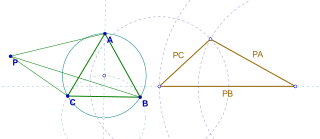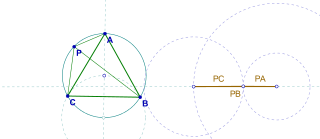Pompeiu's theorem


Pompeiu's theorem is a result of plane geometry, discovered by the Romanian mathematician Dimitrie Pompeiu. The theorem is quite simple, but not classical. It states the following:
- Given an equilateral triangle ABC in the plane, and a point P in the plane of the triangle ABC, the lengths PA, PB, and PC form the sides of a (maybe, degenerate) triangle.
The proof is quick. Consider a rotation of 60° about the point C. Assume A maps to B, and P maps to P '. Then we have  , and
, and  . Hence triangle PCP ' is equilateral and
. Hence triangle PCP ' is equilateral and  . It is obvious that
. It is obvious that  . Thus, triangle PBP ' has sides equal to PA, PB, and PC and the proof by construction is complete.
. Thus, triangle PBP ' has sides equal to PA, PB, and PC and the proof by construction is complete.
Further investigations reveal that if P is not in the interior of the triangle, but rather on the circumcircle, then PA, PB, PC form a degenerate triangle, with the largest being equal to the sum of the others.
External links
This article is issued from Wikipedia - version of the 12/10/2015. The text is available under the Creative Commons Attribution/Share Alike but additional terms may apply for the media files.